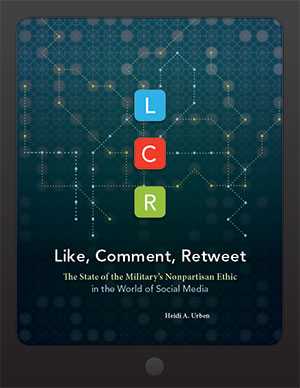DOWNLOAD PDF
Executive Summary
 Past research contends that with the exception of
voting in presidential elections, military officers’
political participation is fairly muted. Moreover,
most allegations of political outspokenness tend to be
levied at retired officers, not those on active duty. Department
of Defense directives provide guidelines on permissible
but traditional forms of political expression for
active duty members of the military, but largely neglect
social media as a forum for political activity. Through
a survey of more than 500 military elites attending the
United States Military Academy and National Defense
University, this project seeks to establish the nature and
extent of political expression by members of the military
throughout social media and whether or not such expression
is in keeping with the norm of nonpartisanship.
Past research contends that with the exception of
voting in presidential elections, military officers’
political participation is fairly muted. Moreover,
most allegations of political outspokenness tend to be
levied at retired officers, not those on active duty. Department
of Defense directives provide guidelines on permissible
but traditional forms of political expression for
active duty members of the military, but largely neglect
social media as a forum for political activity. Through
a survey of more than 500 military elites attending the
United States Military Academy and National Defense
University, this project seeks to establish the nature and
extent of political expression by members of the military
throughout social media and whether or not such expression
is in keeping with the norm of nonpartisanship.
Findings suggest that while most military elites continue
to identify as conservative and Republican, fewer
appear to do so today than at any other time over
the past 30 years. Second, military elites actively use
social media networking sites, although younger elites
are more prolific in their use. Third, while respondents’
nonmilitary friends were more politically active than
their military friends, both active duty and retired military
actively participate in multiple forms of political
and partisan expression, from posting comments on
political issues to “friending” political figures. Fourth,
party identification and political ideology elicit different
responses and behavior about politics on social media.
Military elites who identify as liberals and Democrats
are more likely to have more politically diverse military
friends on social media, but are also more likely to report
feeling uncomfortable by their friends’ politics. Finally,
a striking percentage of those surveyed—50 percent
in some cases—indicated their active duty military
friends have engaged in insulting, rude, or disdainful
comments directed at politicians, elected officials, and
the President, with liberals and Democrats more likely
to report they observed such normative violations. Together,
these findings suggest Republican and conservative
military elites may be more likely to see social media
as their echo chamber and raise further questions about
the politicization of the force. This study concludes by
considering the implications these findings carry for the
norms of an apolitical, nonpartisan military.
READ MORE >>